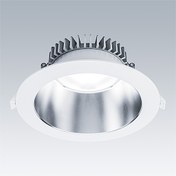Cetus / CETUS3 L LCS LCS EHF RSB
92949632 / E7477369
▼ Data Sheet
A low height, recessed LED downlight. Suitable for ceiling cut-outs Ø190-230 mm for easy refurbishments or fast initial installations. Remote, pluggable, Dimmable in steps LED driver with DC functionality, adjustable 50-100%, NFC configurable. Loop in - loop out possible. Body: Die-cast aluminium for thermal management. Diffuser: polycarbonate, smooth reflector in satinbrite finish with wide beam. Reflector and trim: high quality, highly reflective polycarbonate. Class II electrical, IP20. Spring clips suitable for ceiling thicknesses from 1 to 35 mm.
Equipped with LCS technology, with two lumen outputs (2000lm and 3400lm) and three colour temperatures (3000K, 3500K and 4000K) selectable from below by a rotary switch. Pre-set to 4000K, high luminous flux.
Dimensions: Ø248 x 100 mm
Luminaire input power: 26.9 W
Luminaire luminous flux: 3398 lm
Luminaire efficacy: 126 lm/W
Weight: 0.81 kg
- LED
- CE
- NoIsol
- ENEC11
- GLedReP
- 850°
- Halogenfree
- IK06
- IP44_IP20
- LLedReP
- RG1
- SC2 - Protection Class 2
- Ta= -20 to +25

